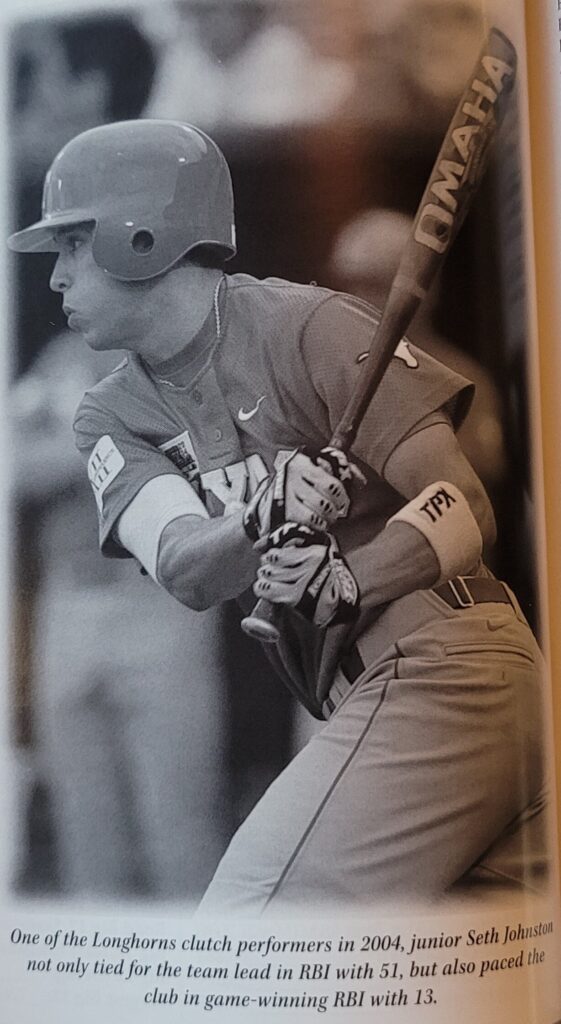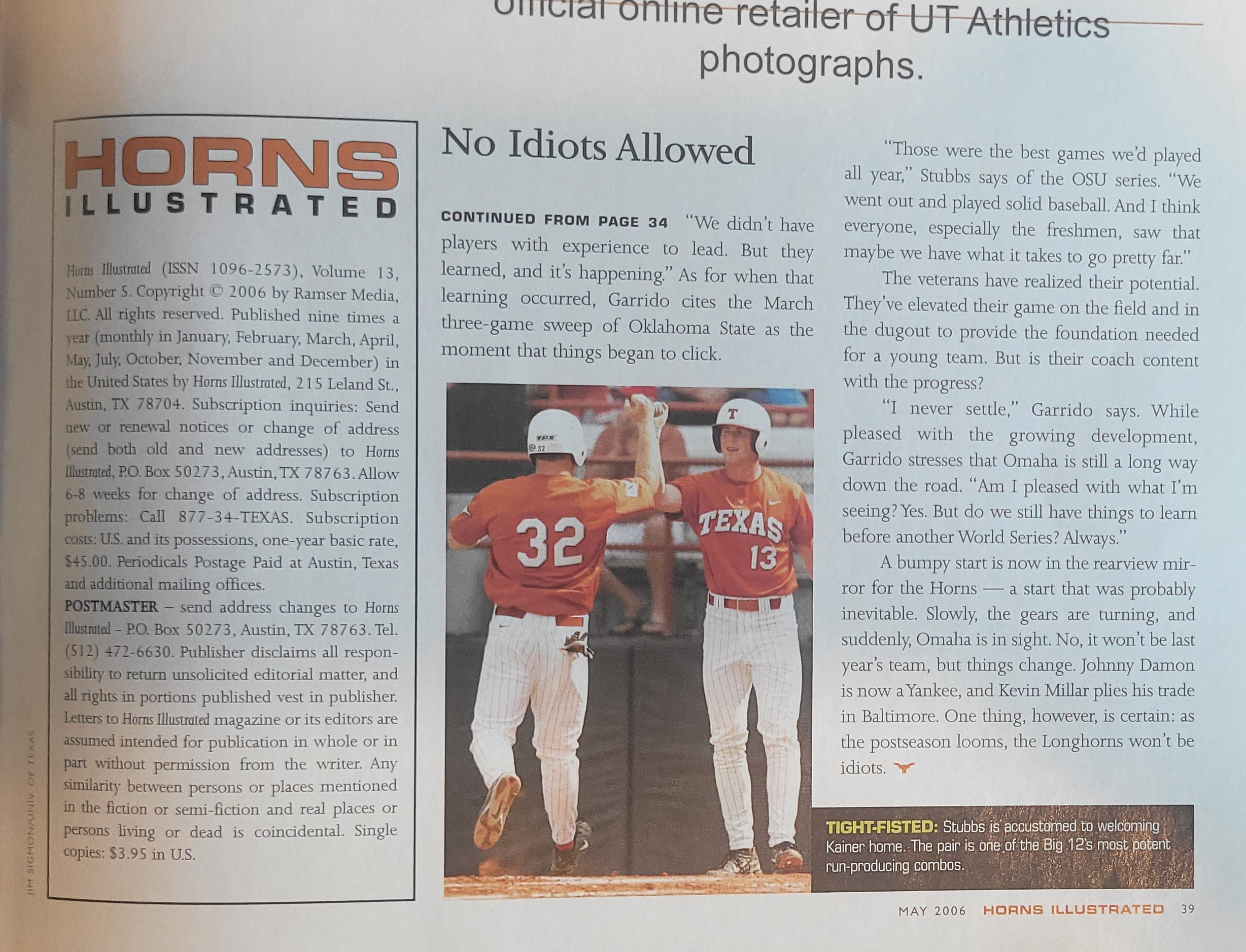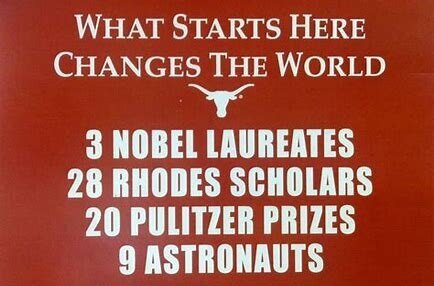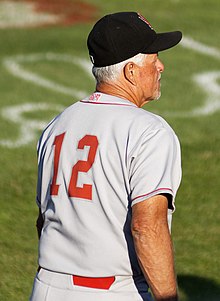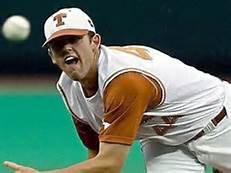1997- 2006 Augie Garrido- baseball
The Texas Longhorns baseball team has a rich history, with a tradition of excellence that spans over a century. Here are some highlights:
- *Six National Championships*: Texas has won six College World Series (CWS) titles, the most recent one coming in 2005. The other championships were in 1949, 1950, 1975, 1983, and 2002.
- *35 CWS Appearances*: The Longhorns have appeared in the College World Series 35 times, which is one of the highest totals in NCAA history.
- *NCAA Records*: Texas holds several NCAA records, including the most wins in a season (61 in 1975), the most consecutive conference wins (34 from 1975-1977), and the most conference championships (16).
- *Legendary Coaches*: The Longhorns have had several iconic coaches throughout their history, including Bibb Falk, Cliff Gustafson, and Augie Garrido. Falk and Gustafson are both members of the College Baseball Hall of Fame.
- *Notable Alumni*: Many notable players have suited up for the Longhorns, including Hall of Famers Greg Swindell and Burt Hooton and current MLB players like Huston Street and Corey Knebel.
- *UFCU Disch-Falk Field*: The Longhorns play their home games at UFCU Disch-Falk Field, which has a seating capacity of over 6,500 and is named after legendary coaches Bibb Falk and Cliff Gustafson.
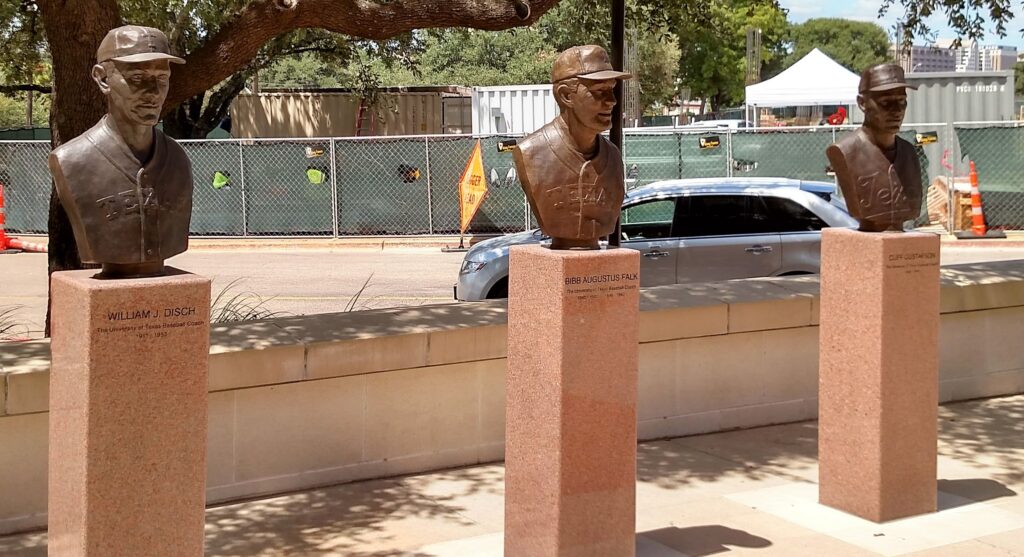
If you have not read Augie’s Bio, “Life is yours to win,” you should. Like DKR, Augie had many insightful comments. Some of his wisdom is shared below in the history of Augie Garrido’s years as a longhorn.
Coach Garrido taught his players to stay in the moment (not the past) and focus on the fundamentals. He said part of coaching fundamentals is “Timing and rhythm…… These kids aren’t machines. They have feelings: they have emotions. This isn’t a game played by robots.”
Huston shares the realities of baseball as told to him by his father, James Street. “I remember the crowd in that final game in Austin in 2002, with the Houston fans chanting and our fans yelling. And when we won it, I remember my dad, and what he told me that day has stayed with me forever. “
“He said, ‘Good job, Bubba.’ Now you have to go out and do it again.”
07.08.2016 | Baseball
Bill Little Commentary: Memories in a Glass
Former Texas Baseball head coach Augie Garrido was inducted into the National College Baseball Hall of Fame last weekend.
By Bill Little, Texas Media Relations Columnist
LUBBOCK, Texas – Given that Saturday night, July 2, had been billed as a “Night of Champions” for college baseball, it will come as no surprise that much of the web woven in the ballroom of the Overton Hotel was linked with threads connected to The University of Texas.
The finest piece, of course, was the induction of Augie Garrido into the National College Baseball Hall of Fame. Augie, who was a dual inductee from both Texas and Cal State Fullerton, became the tenth Longhorn to enter the Hall in its 11 short years of existence.
He is the fourth coach, joining Billy Disch (2008), Bibb Falk (2007) and Cliff Gustafson (2006). Longhorn players enshrined include Brooks Kieschnick (2006), Greg Swindell (2008), Burt Hooton (2008), Keith Moreland (2009), Kirk Dressendorfer (2009), and Richard Wortham (2010).
The 2016 class included retired coaches Robert Braddy of Jackson State and Tommy Thomas of Valdosta State. The players named were J. D. Drew of Florida State, Matt DeSalvo—who won a collegiate record 53 games at Marietta College—Rick Monday of Arizona State and Tom Paciorek of Houston.
Other award winners were Trinity’s Tim Scannell (Skip Bertman National Coach of the Year), Clemson’s Seth Beer (Dick Howser Player of the Year), Kent State’s Eric Lauer (Pitcher of the Year), OU’s Sheldon Neuse (Brooks Wallace Shortstop of the Year), Louisville’s Brendan McKay (John Olerud Two-Way Player of the Year) and the late Gus Steiner (National Collegiate Umpire Award).
As each award winner spoke, an obvious theme permeated their thoughts about the game. Garrido, as usual, set the philosophical tone.
In an interview late in his life, Darrell Royal was asked the question, “What It Means to Be a Texas Longhorn.”
“It is a chance,” Darrell had said.
As he spoke on that Saturday, Augie noted that many people think of baseball as a game of failure. Often, it has been said that the sport respects hitters who bat just over .300—which means you have made an out two-thirds of the time.
As each speaker was interviewed on Saturday, their path to that night was illuminated. Jackson State’s Bob Braddy spent 28 years at his alma mater and, in 2003, became the first African-American coach to be inducted into the College Baseball Coaches Hall of Fame. He remembered working in the fields, picking cotton. Another coach recalled cropping tobacco leaves in the fields of North Carolina.
Augie remembered picking fruit in the valleys of California.
“It wasn’t easy for any of us,” Augie told the crowd of over 400. “But it helped us become who we are. Baseball coaches don’t come from the country clubs.”
“But I see the game as something different from a game of failure. It is a cruel game. It will break your heart,” he said. “But it is like the cliché of the glass being half empty or half full. I choose to see baseball as an opportunity.”
When asked about his decision to go to college rather than enter professional baseball out of high school, one of the honorees said, “I thought about it, and I decided it [going to college] was a piece of life I didn’t want to miss.”
And so with that, “opportunity” became the pervasive theme of the night.
The late Gus Steiner had become a superb collegiate umpire despite losing an arm at a young age. Tom Paciorek turned out to be one of those threads connected to Texas. He had gone to the University of Houston as a football and baseball player. In 1966, he was part of history when his Cougars played Texas in the NCAA District playoffs in the Astrodome—the first indoor college games ever played. A year later, he was a part of another kind of Longhorn history, as UH came from behind to knock Texas out of the 1967 NCAA playoffs, defeating a favored Texas team in the final game Bibb Falk ever coached.
And then there was Augie.
When his 1995 Cal State Fullerton team won the College World Series, it was Garrido’s third national championship in 17 seasons. That squad is still considered perhaps the best in the game’s history. By 1996, Augie had established the Titans as a national power and taken a three-year swing in the Big Ten, where he brought Illinois its first league title in years.
Texas had parted ways with Cliff Gustafson, who at the time was the winningest coach in the history of the game. The Longhorn job was open. Was it a glass half empty? Or half full? The answer, it turned out, came from his roots. Augie’s mom had been part of a West Texas family, growing up not far from Lubbock. The Dust Bowl had driven her family from the state, but the lure of the Lone Star was always a part of his DNA.
Following the 1996 season, he surveyed his life and, with his life partner Jeannie Grass, agreed with DeLoss Dodds and Butch Worley to become the Longhorns coach. What followed would be two more CWS titles and two second-place finishes. And as television brought the college game into the bright lights, he became the winningest coach of all time in 2003 in a series where the Longhorns eliminated No. 1 ranked Florida State in Tallahassee.
More than that, he taught kids about baseball and life. He told them how to conquer fear, saying the only way to do it was with confidence. He taught them that they had been given a gift: a chance to play a kid’s game at the highest collegiate level.
And there, my friends, is that word again.
What was it Darrell said that it meant to be a Longhorn?
“It is a chance,” he said. No more, no less. An opportunity.
And therein comes the final piece of the “Night of Champions” that connected the evening to the Longhorns.
In the period from 1968 through 1974, Cliff Gustafson’s Longhorns were a fixture at the College World Series. Time after time, they and others would be thwarted because of a dynasty built by Rod Dedeaux at Southern Cal. In short, as teams came to Omaha, most teams came “hoping” to win. Southern Cal came “expecting” to win.
But when the Longhorns got to Omaha in 1975, Southern Cal was not there. That was because a young coach named Augie Garrido, whose small school had a budget of less than $5,000 had shocked the Trojans in a regional in their own park.
That was when Augie met Cliff, and a friendship ensued that would be a part of the fabric of Texas baseball. Texas won the 1975 title because of the heroics of players like Keith Moreland, Mickey Reichenbach, Jim Gideon, and Richard Wortham.
But there was one other guy who made a difference.
In the Longhorns’ win over South Carolina that led to an eventual championship game, a power-hitting outfielder struggled at the plate. Gustafson called time out and, with a count of 0-2 on the batter, called on Mark Griffin, a little guy whose limited career had produced only a .263 batting average. And he sent him to the plate. With only one strike left, he laced a single that plated a run and ignited a six-run rally.
In the program for College Baseball’s “Night of Champions”, page 14 is a full-page ad with a collection of baseballs photographed in sepia tone, as if they are artifacts from the past. Centered in the middle of the page is this quote from the legendary Cleveland Indians pitcher Bob Feller:
“Every day is a new opportunity. You can build on yesterday’s success or put its failures behind you and start over again. That’s the way life is, with a new game every day, and that’s the way baseball is.”
The page is sponsored by Mark Griffin, a former Texas Tech regent who was the head of his dad’s oil empire, which included Griffin Oil, Griffin Fuel and Transportation, Pro Petroleum, and Rip Griffin Travel Centers.
It is, after all, about opportunity.
Augie is the 13th Coach in Texas baseball history.
Garrido is one of only two coaches Who was able to lead two colleges to a national championship.
In 1959, a dejected Fresno State player left the College World Series field and wept. Augie Garrido had overthrown a ball from the outfield that allowed the winning run to cross home plate. It was an ominous start for the best collegiate baseball coach of all time.
The coach had a different philosophy from most coaches in baseball. He believed that if the player’s mind was balanced, then good baseball would follow. He taught the fundamentals of the game but focused on the player’s mental game. Without this balance of the two, the players would have a tough time maximizing their abilities. In Augie’s biography, he says, “Fear and expectations can be crippling” mentally.
“Fear will strike; it always does; the emotion takes you out of the moment and into our own head.” The only way for a baseball player to stop a downward spiral is to quit pressing and return to playing the game. “Confidence overcomes fear, but confidence is often fleeting while fear hangs on.” The best way to control fear is to clear your head. Augie says we tell the players to “get outside of your head because that is where the competition is.” Page Elizabeth Bauerkemper, in her 2013 report titled Beyond Sports: A Guidebook for Potential Collegiate Female Student-Athletes, agrees with Augie, saying, “Changing the way athletes view pressure can change the way it is experienced.”
On the other hand, expectations serve someone else and motivate from the outside in. If you try to live up to other people’s expectations, you are dealing with things you cannot control. Accomplishing realistic personal goals helps build a character from the inside out. Lessons learned from playing baseball are transferable to life after baseball. Baseball “doesn’t give us what we pray for. It doesn’t give us what we wish for. It doesn’t give us anything other than OPPORTUNITY, nothing more, nothing less, and that is enough. In fact, it’s a great gift.” Life gives most people opportunities, but what you do with this gift will define your destiny.
Coach Garrido said if both teams are equal in “superior athletic ability, knowledge of a game’s strategy, and mastery of its skills, success is usually claimed by those in command over the mental aspects of baseball”—fear and expectations.
Page Elizabeth Bauerkemper, in her 2013 report Beyond Sports: A Guidebook for Potential Collegiate Female Student-Athletes, agrees with Augie. She states, “Changing the way athletes view pressure can change the way it is experienced.” Coaches’ criticism should not be construed as a personal attack but as a “motivation to do well.”
A Reflection on Augie Garrido’s life is at the end of this site.
Below is a link to the trailer for a documentary about Augie Garrido
https://www.rottentomatoes.com/m/inning_by_inning_portrait_of_a_coach/
Augie Garrido
Click on the link below for more on Augie.
https://www.facebook.com/HookEmBaseball/videos/3231131856937370/?t=22
1997 to May 2016- Coach Augie Garrido
-
One of the only coaches who has won the CWS as a coach and appeared as a player.
-
9 Conference titles
-
2 National Champions ( 2002 and 2005)
-
8 Super Regional victories and nine regional victories
-
HOH induction 2008
-
The winningest coach in the history of college baseball, with 1900-plus victories
-
Earned National Coach of the Year honors 6 times
-
During his 46-year career, he averaged 41 victories a year.
-
In the summer of 2016, he was enshrined in the American Baseball Coaches Association Hall of Fame and entered the National College Baseball Hall of Fame in July 2016.
-
While at Texas, Garrido coached 27 All-Americans and 102 players who went on to play professionally.
Skip Johnson is the Associate Head Coach
-
Specializes in teaching pitching skills
-
In the 9 years with UT, he has developed 10 Big 12 conference first-team players and 9 All-Americans.
Coach Tommy Nicholson is the recruiting coordinator.
-
He played for Texas and was the most valuable player on the team in 1999 and 2000
-
His job responsibility is to be the head recruiter and coach the infielders.
1996-1997- 29-22- Texas ranked 7th in the Big 12.
1997- Four teams in the Big 12 were ranked in the top 25 nationally. Texas’s Horns were beset with injuries, but Texas still was honored as the first school in NCAA history to record 2500 wins.
Gus was inducted into the San Antonio Sports Hall of Fame.
1997-1998-23-32-1
In 1998, Catcher Brian Johnson, During A One Week Span, Hit 2- 400 Plus Feet Homers At UFCU Field.
1998 – The Horns had one of the toughest schedules in the country.
1999- 36-26
1999- 11 letter winners and a great recruiting class started turning the program around. Led by Scott Dunn and Jason Cox, the pieces started to fit together. Texas swept perennial power USC this year. Texas finished with a 17-13 record and 6th in the conference but qualified for the Big 12 tournament. They lost in tournament play but were selected to the 64-team NCAA tournament, losing to Houston in the regionals.
Tommy Nicholson is named the most valuable player on the Texas team.
1999- 2000- 46-21 Augie garrido
The 2000 team returned 12 lettermen and represented two of the best recruiting classes in the nation. The Horns won the regionals and were the number 7 seed in the NCAA tournament. However, LSU and Florida State eliminated the Horns from tournament play. Still, this was a good year for Texas baseball.
Horns set a NCAA record for sacrifice hits in a season (126), and notched more saves (20) than any club in school history.
6 athletes made the Academic All-Big 12, and Matt Rosenberg earned GTE Academic All-District accolades.
Thames was only the 32nd First Team All-American in UT history. His 19 saves shattered the UT single-season record, and he tied the UT career record.
Texas played in the Tempe Regional against highly touted Arizona State. Texas survived the first championship game in the afternoon, winning 6-4. Then, behind ace Beau Hale’s dramatic finish, the Longhorns took the nightcap, 9-7. That was the second year the NCAA had employed the use of “Super Regionals,” and when Penn State was an upset winner in its regional, Texas was awarded the Super and swept its way back to Omaha in two games.
.
D.J. Jones wins the James Keller Sportsmanship Award
Beau Hale pitched the 18th recorded no-hitter in school history.
Top-rated song in 2000
2001- 36-26 pending Augie Garrido
2002 – 57-15 National Champions – Augie garrido
The team won the Big 12 conference and tournament. For the first time since 1996, Texas hosted an NCAA Regional tournament. The Horns won both the Big 12 conference regular season and tournament title for the first time in the same season.
The 2002 National Championship Louisville Slugger bat is on display at the Stark Center.
Chris Carmichael comes off the bench after injuries and a disappointing season to put his name in the record book. In the CWS final game against South Carolina, with two men on base, he hit a homer on college’s biggest stage.

This team holds the Longhorn baseball record for 41 consecutive scoreless innings. Garrido was both Big 12 and National Coach of the year
The Longhorns opened the 2002 campaign with a 13-2 overall record but quickly incurred a setback by beginning conference play with a 2-4 mark. The Horns were driven by their quest for Texas’ first-ever Big 12 title.
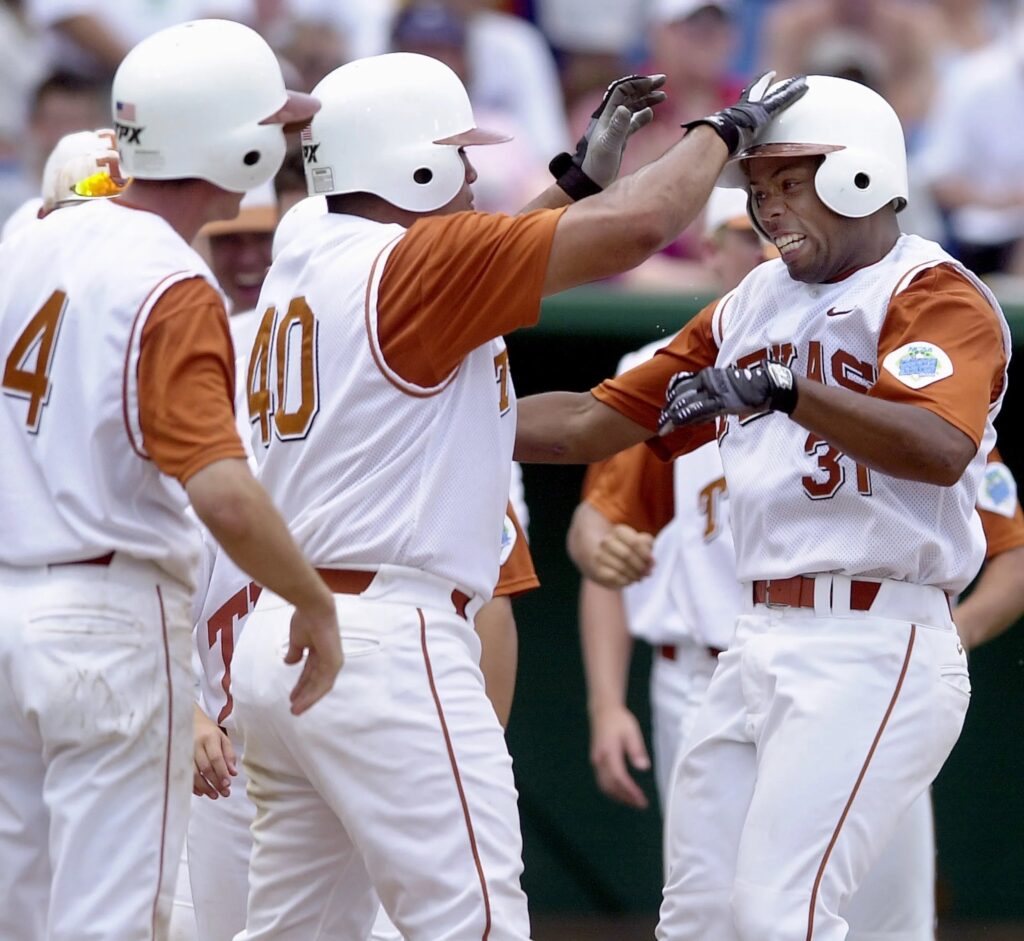
UT made the conference tournament, which was being held for the first time at The Ballpark in Arlington, as the league’s No. 1 seed. Tied 6-6 with the Huskers heading into the top of the ninth inning of the tournament’s final game, the Horns scored six runs to win 9-6, winning their first-ever Big 12 Tournament Championship.
UT won a 5-2 over Houston to win the super regional title and earn its NCAA-record 29th CWS appearance.
A total of 14 different Longhorns accounted for game-winning RBI’s in 2002. Three of those standouts included Omar Quintanilla, Ryan Hubele, and Kalani Napoleon.
Huston Street says, “It is one of the most profound moments of my entire career and life for that matter. He walked in (Augie), looked us all in the eye, stood there with a small moment of pause, and said this: ‘The world treats winners differently than it does losers.’ And then he walked out. It was the most spot-on sentence, which is true.”
“This game will not change who you are, whether this team goes on and wins the national championship or not, but it is important to understand the consequences. Before those games in the NCAA playoffs, I had no aspirations of playing major league baseball, but when we finished, I remember thinking, ‘Hey, I think I can do this.'”
Huston Street gets the save in all 4 of the CWS games. He was the hero of the series, but in February and March, the pitching coach, Frank Anderson, was struggling to help Huston with his straight-as-a-pencil fastball that was too easy to hit. Coach Anderson said, “The competitiveness was there, but his stuff wasn’t moving enough.”
“There wasn’t much deception.” I guess the coach corrected the problem. Whatever it is, the way you tell your story online can make all the difference.
The pitching staff on this Team Holds The Record during the modern era For saves (23).
Augie Garrido is Coach of the year.
This team holds the Texas record for most total bases (1,186).
Chris Carmichael comes off the bench after injuries and a disappointing season to put his name in the record book. In the CWS final game against South Carolina, with two men on base, he hit a homer on college’s biggest stage.
Justin Simmons records a 16-1 – American- finalist for the Dick Howser Trophy and the Rotary Smith Award
Street earned the CWS Most Outstanding Player Award after posting a CWS-record four saves. Simmons, Majewski, and sophomores Tim Moss and Omar Quintanilla were named part of the CWS All-Tournament Team.
2002-2003- 50-20 Augie Garrido Record 30th CWS appearance.
The team was known for its ability to score with two outs, scoring 187 runs and 486 with two outs.
2003-2004- 58-15 Texas is runner-up in the College World Series, losing to Cal State Fullerton.
”This team had the instinct and will to win as well as the athleticism and talent to make it happen.” Augie Garrido
Coming off 50-win seasons in 2002 and 2003 and three of the last four years at the CWS tournament, the 2004 team returned 17 letter winners, four starters, and eight pitchers. Augie hired Tom Holliday as the pitching coach. Texas won its second Big 12 championship and was the number one seed in the tournament, but it finished second with Oklahoma State. Texas won the Super Regional and returned to the CWS for the fourth time in five years.
2004 Curtis Thigpen, Taylor Teagarden, and Drew Stubbs came out swinging in the post-season. Curtis led the team in 9 major offensive categories.
The Horns lost to Cal State in the finals. 15 players earned All-Big 12 honors, and two were All-Americans.
In 2016, Coach Garrido told the Statesman that Huston Street was the best Longhorn he ever coached. “What might seem exceptional for one person was very normal for Huston…………., Garrido said of Street, “His fearless approach to throwing to the mitt and trusting his teammates to do the rest — he came here with that.”
Huston Street holds the Texas career record for most saves (41), is a GOLDEN SPIKES AWARD FINALIST, and is an All-American.
Justin Simmons holds the Texas career record for the number of starts (66) and is an All-American.
2004- 2005- 56-16 National champions
The Horns had two All Americans, 16 picked up All-Big 12 accolades, and head coach Garrido was the National Coach of the Year for the sixth time in his career. Texas had 21 come-from-behind wins in 2005. The Horns set a single-season school record for fielding percentage (.978) and double plays (80).
12.04.2009 | Football Bill Little commentary: Time to play
Bill Little, Texas Media Relations
In a way, I am reminded of Augie Garrido and his Longhorn baseball team a day or so before UT won yet another College World Series championship a few years ago. Sensing his team’s pressure, Garrido took them out to the outfield before one of their final practices. He talked there about a bat and a ball and a game they played since they were kids.
“You don’t ‘work’ baseball,” Garrido had said. “You ‘play’ it.”
Augie says that the 2005 team was special because it was confident and enjoyed playing the game. This team found a “fabulous balance of competitive genius and boyish fun.” This was Texas’s fourth straight appearance at the CWS.
Kyle McCulloch
All but one starter are all from the state of Texas. Pitchers McCulloch and Alaniz are chosen for the finals best 2 out of 3 with Florida. McCulloch says before the game,” I was thinking about when I was a kid rooting for Texas teams–the football team in the fall and the baseball team in the College World Series.” “With all the great tradition and history of the school, to be able to pitch for Texas in a championship game, that’s unbelievably huge.” “…… it is to wear the burnt orange. “
Tough road to the CWS. In regional play lost to Arkansas and Mississippi but fought back and won 5 elimination games to make it to the CWS.
A special moment, a coaching decision, and a young player with a special spirit all make college football history. Chance Wheeless, who suffered a shoulder injury the day before, was scheduled as the leadoff hitter in the bottom of the 9th against Baylor, with the score tied 1-1. The Baylor team dominated the Horns during the regular season, and Chance was hurt, so Augie decided to send in a pinch hitter. Chance objected and convinced Augie that he knew the Baylor pitcher’s tendency better than anyone and that he could handle the shoulder pain. There was a collective moan from the fans and announcers when Wheeless stepped into the batter’s box. No one could believe that Augie decided to allow the injured Wheeless to lead off, but with the count at 1-1, please view the following video to see what happened.
David Moroul was the 6th player from the Longhorns to win the College World Series Most Outstanding Player. The others are Tom Hamilton, Mickey Reichenbach, Calvin Schiraldi, Huston Street and J.L. Smith. Augie calls David a superhero because he was the weakest link on offense and the strongest link on defense He put on his Superman cape for the CWS to bat .500, including 2 home runs, scoring 8 runs, and committing no fielding errors.
J. Brent Cox is an All-American and the winner of the NCBWA STOPPER OF THE YEAR AWARD.
Augie Garrido is Coach of the Year.
2005-2006- 41-21
Drew Stubbs was an Academic All-American in 2005 and 2006 and a GOLDEN SPIKES AWARD FINALISTS in 2006. CF: Drew Stubbs (2004-2006)
Stubbs was an integral part of teams that finished second and first in the nation and a 2006 team that was shocked in the NCAA regionals. Stubbs was the number 32 overall prospect in his high school class, but the Atlanta, Texas native forewent the draft to play for Augie Garrido’s team.
Stubbs never hit under .300 during his three years in Austin. He had a rare combination of speed and power, as he is in the top 10 all-time for Texas career steals (86) and homers (31). He was the co-Big 12 Player of the Year in 2006 and a Golden Spikes Award finalist in the same year. Oddly enough, all three of Stubbs’ seasons are also in the top eight for most single-season strikeouts by a Texas player.
Coach Garrido’s contributions to Longhorn traditions represent a portal to the past that reminds Longhorn fans that heritage shapes the present and empowers the future.
Augie quotes from his autobiography.
To self-correct, you have to self-assess.
Fears are feelings, not facts. You can refuse to give them power.
Parents of young kids mean well, but sometimes, they live vicariously through their children and put undue pressure on them to succeed. The result, too often, is that young men never develop the self-confidence and self-respect necessary to guide their own lives. ” The worst thing parents can do is withdraw their love if the child doesn’t meet athletic expectations.”
Augie wisely notes that as we grow into imperfect men ourselves, we appreciate our fathers even more because we better understand them and the challenges they face.
It is important to play baseball like a kid caught up in the game.
”We will strive for perfection, but you will fail.” It takes courage to keep striving after you fail.
If you spend your life seeking approval or rewards from others- whether it is love or acceptance- you will never find the fulfillment that comes from accepting and loving yourself.
Stay in the Moment and focus on fundamentals.
Rather than following in our father’s footsteps, we chased their dreams.
We have found that most of the learning in both life and baseball occurs when there has been a failure.
In baseball and life, “homers get all the glory, but bunting is the essence “ of all.
We tend to accrue limits as we age, either because we put limitations on ourselves or we accept those placed upon us by others. People who can blast through these limits are a rare breed.
02.24.2005 | Baseball
Head Coach Augie Garrido
Bill Little
Five trips to the College World Series (CWS) in the last six seasons. National Championships in both 2002 and 2005. Second and third-place national finishes in 2004 and 2003, respectively. Two Big 12 Conference Championships (2002 and 2004) and a pair of league tournament crowns (2002 and 2003). These are the results and the reasons why head coach Augie Garrido was hired to guide the Texas baseball program in 1996.
During his nine years in Austin, Garrido also became the all-time winningest coach in NCAA Division I baseball history by capturing his 1,428th career victory on June 9, 2003 (a 6-5 Texas win over then No. 1 Florida State during NCAA Super Regional action in Tallahassee, Fla.). Additionally, while he brought Texas back to the CWS for the first time since 1993 during the 2000 campaign, he then returned the Horns to the pinnacle of collegiate baseball in 2002 by leading UT to a 57-15 overall record that produced the school’s first-ever Big 12 regular-season and tournament championships as well as its first national title since 1983. A mere three years later in 2005, he duplicated the feat by guiding the Longhorns to their sixth National Championship – the second-most for one school in NCAA history. Texas’ rise under Garrido has been the culmination of inking nine straight top 15 recruiting classes and producing teams that have stood tall against perennial powers such as LSU, Miami (Fla.), Stanford and USC. Now, as he enters his 10th year in Austin, Garrido, who was selected as both the 2002 and 2005 National Coach of the Year, looks to keep the program in contention for college baseball’s ultimate prize each and every season.
A legend in his own right, Garrido is one of only two coaches in Division I baseball history to tally 1,500 or more career victories. As if that were not impressive enough, Garrido is also the first coach to lead teams from two different schools to national crowns (Cal State Fullerton & Texas), guide squads to National Championships in four different decades, and is one of only three coaches in history to win five or more NCAA titles (1979, 1984, 1995, 2002, 2005). In fact, Garrido is the only coach in the modern era of NCAA football, baseball and men’s or women’s basketball to ever lead teams from two different schools to national crowns – only football legend Pop Warner accomplished such a feat by leading Pittsburgh (1916 & 1918) and Stanford (1926) to National Championships. Additionally, Garrido has earned 12 trips to the CWS after making 25 NCAA Regional Championship appearances, including seven at Texas, while garnering National Coach of the Year honors six times (1975, 1979, 1984, 1995, 2002, 2005), regional coach of the year accolades following seven different seasons (1975, 1979, 1984, 1995, 2002, 2004, 2005) and conference coach of the year distinctions on four occasions (1987, 1995, 2002, 2004), as he has led his clubs to 20 league crowns.
The Vallejo, Calif., native is just the 13th coach in UT’s 111-year baseball history, and, with the exception of the war years of 1943-45 when Blair Cherry was at the helm, is only the fourth Texas head coach since 1911.
Despite his numerous accolades and honors, Garrido has not reached the peak of collegiate baseball with a “win at all costs” attitude. Instead, he has taken a slightly different approach to coaching the game of baseball.
Contrary to the myth that baseball is a game of strictly bats and balls, Garrido firmly believes that it is a thinking man’s game. It is his claim that no corked bat or tainted ball has ever been as potent a weapon on the field of play as the mind of a knowledgeable ballplayer.
“I want my players to be aware of what is most valuable to them,” Garrido said. “Is it a bat, a ball, a glove or the ability to use those things? Is that it? No. It’s the players’ minds and their ability to use them. That’s what makes the use of a bat, a ball and a glove brilliant. It’s my job to help players find balance in their lives. I want to help them help themselves become what they want to be through the fundamentals of baseball. Baseball is nothing more than another classroom in the educational process. Really, baseball is a metaphor for life.”
As a result of his unique coaching style, Garrido has been ranked as one of the top three baseball teachers in the nation by Major League Baseball Directors of Player Development. To deserve that distinction, Garrido has coached three Golden Spikes Award winners, three National Players of the Year, six College World Series MVPs, 41 All-Americans, 127 All-League selections and 73 professional players over his career. He has also had 11 of his players selected in the first round of the Major League Baseball Amateur Draft, including Longhorns Beau Hale (No. 14 to Baltimore) in 2000, Omar Quintanilla (No. 33 to Oakland) in 2003 and both J.P. Howell (No. 31 to Kansas City) and Huston Street (No. 40 to Oakland) in 2004. In addition, during his nine years in Austin, Garrido has tutored the skills of 15 players who have earned All-America honors a total of 19 times, 13 Freshman All-Americans, 53 All-Conference performers, including a school-record 15 in 2004, eight USA Baseball National Team members and 46 players who have gone on to play in professional baseball.
Graduating from Fresno State in 1961, Garrido played three seasons for the Bulldogs and earned All-Conference recognition while also taking part in the 1959 College World Series. To salute his efforts at the school, Garrido, who remains, along with his UT predecessor Cliff Gustafson, as one of only nine men ever to both play and coach in the CWS, was inducted into the Fresno State Hall of Fame in 1993 and was named the recipient of the school’s Top Dog Award in 2002 as its Alumnus of the Year in athletics.
Upon graduating, Garrido signed a professional contract with the Cleveland Indians and played six years in their minor league system before retiring in 1966 to accept a coaching position at Sierra High School in Tollhouse, Calif.
Three years later, Garrido’s collegiate coaching career began when he accepted the head job at San Francisco State in 1969. The Gators went on to post a 25-14 record in his first collegiate season.
The new college head coach would then spend his next three seasons at Cal Poly-San Luis Obispo (1970-72) and tally an 86-62-1* overall record.
After his stint with the Mustangs, Garrido took the reigns of the Cal State Fullerton program in 1973 and not only embarked on the first of two highly successful campaigns with the Titans but also forever left his mark on the collegiate game. Under his guidance in 1975, Cal State Fullerton celebrated their first season of Division I play by reaching the playoffs for the first time in history and advancing to the CWS. The Titans then won their first of four national titles a mere four years later in 1979, in only their second CWS appearance. Their second NCAA crown would follow in 1984 as Garrido’s Titans defeated defending national champion Texas by a score of 3-1. During his first tour of duty at Fullerton, which spanned 15 seasons, Garrido’s Titans recorded a mark of 665-292-6 (.694).
For the 1988 season, Garrido headed north to Illinois, where, in three years, he led the Fighting Illini to two Big 10 championships, including the school’s first in 26 seasons. Before departing Champaign, Ill., Garrido would compile a record of 111-57 (.661) and twice lead the Fighting Illini to the NCAA Tournament.
With the conclusion of Illinois’ 1990 campaign, Garrido returned to Fullerton, where, in six seasons, he guided the Titans to a 264-99 (.727) record and was named the Big West Conference Coach of the Year for the second time in his career (1987 (Co-Coach) & 1995). During that run, his 1995 Titans club won their final 18 games of the year en route to posting an astonishing 57-9 record and capturing Cal State Fullerton’s third national title. Over his 21-year tenure at Fullerton, Garrido produced a remarkable overall record of 929-391-6 (.703), while netting seven College World Series appearances, one runner-up finish and three national crowns.
His overall record after 37 years of collegiate coaching, including a 391-193-1 (.669) mark with the Longhorns over the last nine seasons, currently stands at 1,542-717-8 (.682), which translates into an average of more than 41 victories per season.
Garrido’s name is also held in high regard when people speak of his accomplishments in the College World Series. He is currently tied for second with five National Championships (trailing only Rod Dedeaux’s 10 at USC), ranks fourth and sixth, respectively, in wins (34) and winning percentage (.680; 34-16), as well as fifth in both series games (50) and appearances (12) among all-time coaches. He is also one of only eight men in history to coach two or more different teams in the CWS and is only the third Longhorns head coach (Bibb Falk & Cliff Gustafson) in the 110 years of Texas baseball to lead the Horns to Omaha.
In conjunction with his collegiate baseball coaching career, Garrido has also served as an assistant coach on Team USA in 1990, took his 1979 National Champion Fullerton team to Taiwan on a Goodwill Tour and has managed in the Alaska Summer League.
